An Analysis of Self Determination on Human Rights and Social Justice
VerifiedAdded on 2023/01/19
|9
|2385
|42
Essay
AI Summary
This essay examines self-determination, human rights, and social justice concerning Aboriginal Australians and Torres Strait Islander people. It discusses the historical context, including the impact of the Royal Commission on Aboriginal Deaths, the Mabo decision, and the establishment of the Aboriginal and Torres Strait Islander Social Justice Commissioner. The essay explores the definition of social justice, drawing on John Rawls' principles, and outlines the rights of Indigenous Australians, including self-determination and land rights. It highlights the Commissioner's role in promoting Indigenous rights, reporting to Parliament, and raising social awareness. The essay also touches upon the challenges faced by Indigenous communities, the government's approach to self-determination, and the role of organizations like the Victorian Equal Opportunity and Human Rights Commission, and issues surrounding asylum seekers. Overall, the essay emphasizes the importance of recognizing and respecting Indigenous rights for sustainable development and social justice.
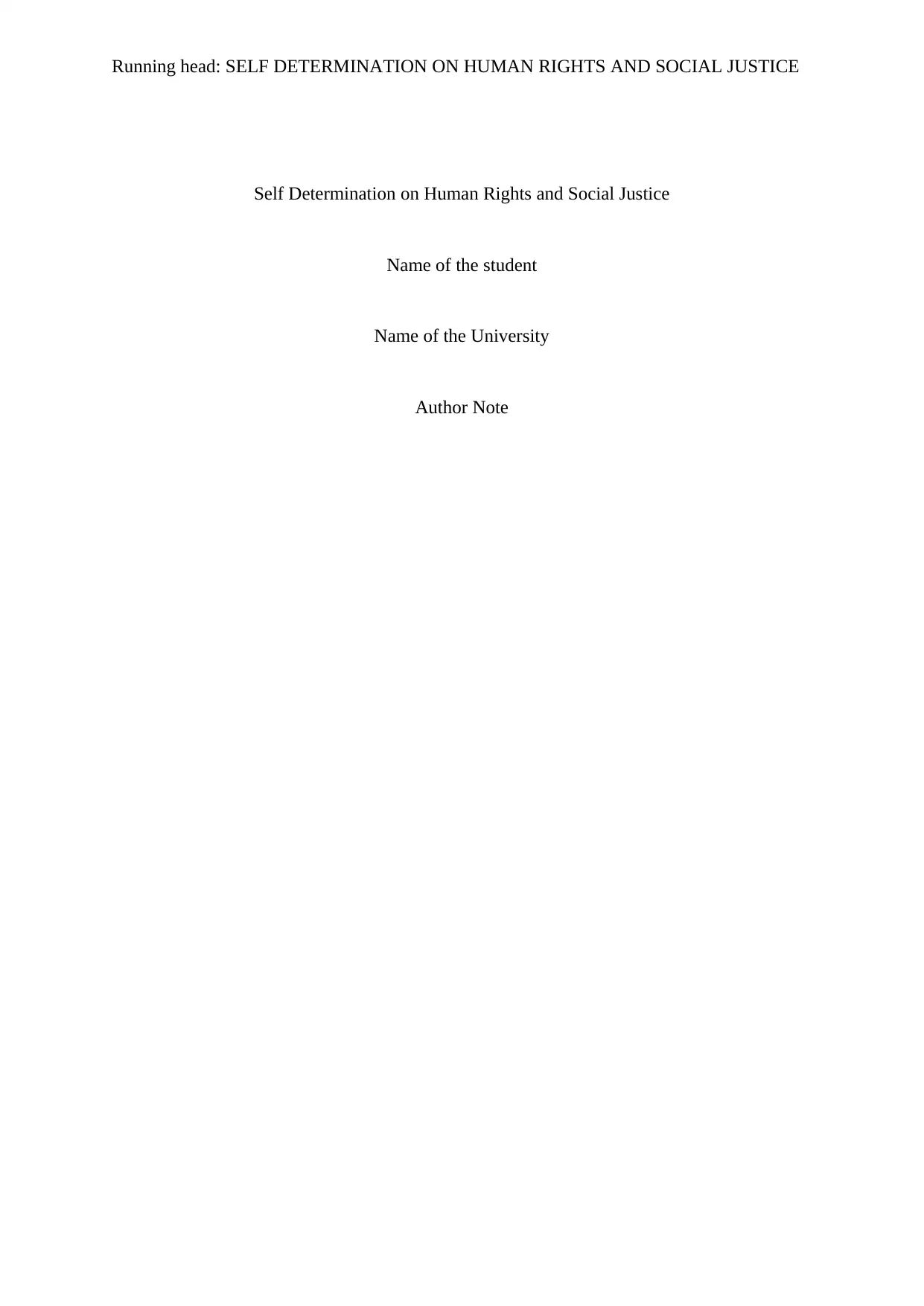
Running head: SELF DETERMINATION ON HUMAN RIGHTS AND SOCIAL JUSTICE
Self Determination on Human Rights and Social Justice
Name of the student
Name of the University
Author Note
Self Determination on Human Rights and Social Justice
Name of the student
Name of the University
Author Note
Paraphrase This Document
Need a fresh take? Get an instant paraphrase of this document with our AI Paraphraser
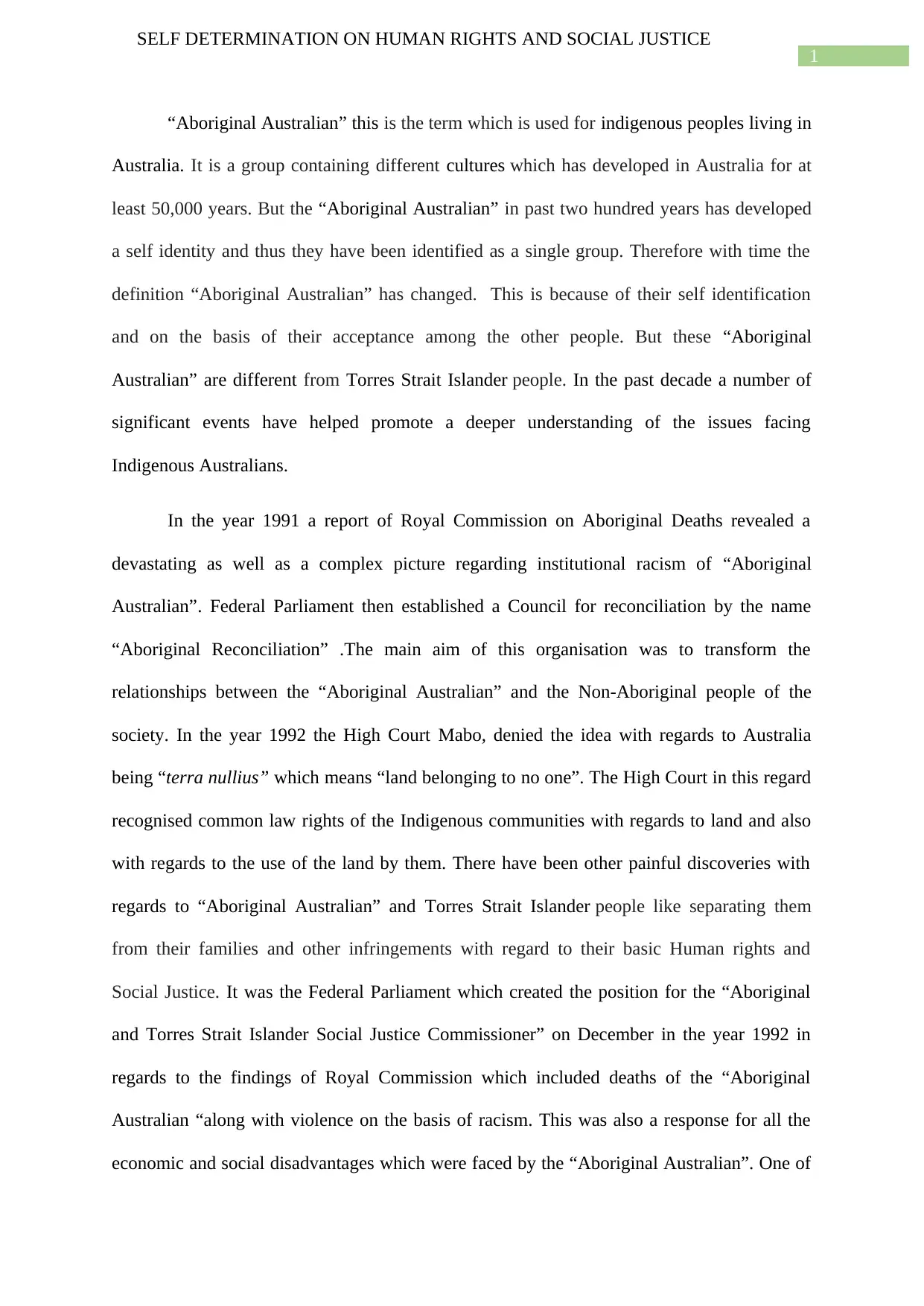
1
SELF DETERMINATION ON HUMAN RIGHTS AND SOCIAL JUSTICE
“Aboriginal Australian” this is the term which is used for indigenous peoples living in
Australia. It is a group containing different cultures which has developed in Australia for at
least 50,000 years. But the “Aboriginal Australian” in past two hundred years has developed
a self identity and thus they have been identified as a single group. Therefore with time the
definition “Aboriginal Australian” has changed. This is because of their self identification
and on the basis of their acceptance among the other people. But these “Aboriginal
Australian” are different from Torres Strait Islander people. In the past decade a number of
significant events have helped promote a deeper understanding of the issues facing
Indigenous Australians.
In the year 1991 a report of Royal Commission on Aboriginal Deaths revealed a
devastating as well as a complex picture regarding institutional racism of “Aboriginal
Australian”. Federal Parliament then established a Council for reconciliation by the name
“Aboriginal Reconciliation” .The main aim of this organisation was to transform the
relationships between the “Aboriginal Australian” and the Non-Aboriginal people of the
society. In the year 1992 the High Court Mabo, denied the idea with regards to Australia
being “terra nullius” which means “land belonging to no one”. The High Court in this regard
recognised common law rights of the Indigenous communities with regards to land and also
with regards to the use of the land by them. There have been other painful discoveries with
regards to “Aboriginal Australian” and Torres Strait Islander people like separating them
from their families and other infringements with regard to their basic Human rights and
Social Justice. It was the Federal Parliament which created the position for the “Aboriginal
and Torres Strait Islander Social Justice Commissioner” on December in the year 1992 in
regards to the findings of Royal Commission which included deaths of the “Aboriginal
Australian “along with violence on the basis of racism. This was also a response for all the
economic and social disadvantages which were faced by the “Aboriginal Australian”. One of
SELF DETERMINATION ON HUMAN RIGHTS AND SOCIAL JUSTICE
“Aboriginal Australian” this is the term which is used for indigenous peoples living in
Australia. It is a group containing different cultures which has developed in Australia for at
least 50,000 years. But the “Aboriginal Australian” in past two hundred years has developed
a self identity and thus they have been identified as a single group. Therefore with time the
definition “Aboriginal Australian” has changed. This is because of their self identification
and on the basis of their acceptance among the other people. But these “Aboriginal
Australian” are different from Torres Strait Islander people. In the past decade a number of
significant events have helped promote a deeper understanding of the issues facing
Indigenous Australians.
In the year 1991 a report of Royal Commission on Aboriginal Deaths revealed a
devastating as well as a complex picture regarding institutional racism of “Aboriginal
Australian”. Federal Parliament then established a Council for reconciliation by the name
“Aboriginal Reconciliation” .The main aim of this organisation was to transform the
relationships between the “Aboriginal Australian” and the Non-Aboriginal people of the
society. In the year 1992 the High Court Mabo, denied the idea with regards to Australia
being “terra nullius” which means “land belonging to no one”. The High Court in this regard
recognised common law rights of the Indigenous communities with regards to land and also
with regards to the use of the land by them. There have been other painful discoveries with
regards to “Aboriginal Australian” and Torres Strait Islander people like separating them
from their families and other infringements with regard to their basic Human rights and
Social Justice. It was the Federal Parliament which created the position for the “Aboriginal
and Torres Strait Islander Social Justice Commissioner” on December in the year 1992 in
regards to the findings of Royal Commission which included deaths of the “Aboriginal
Australian “along with violence on the basis of racism. This was also a response for all the
economic and social disadvantages which were faced by the “Aboriginal Australian”. One of
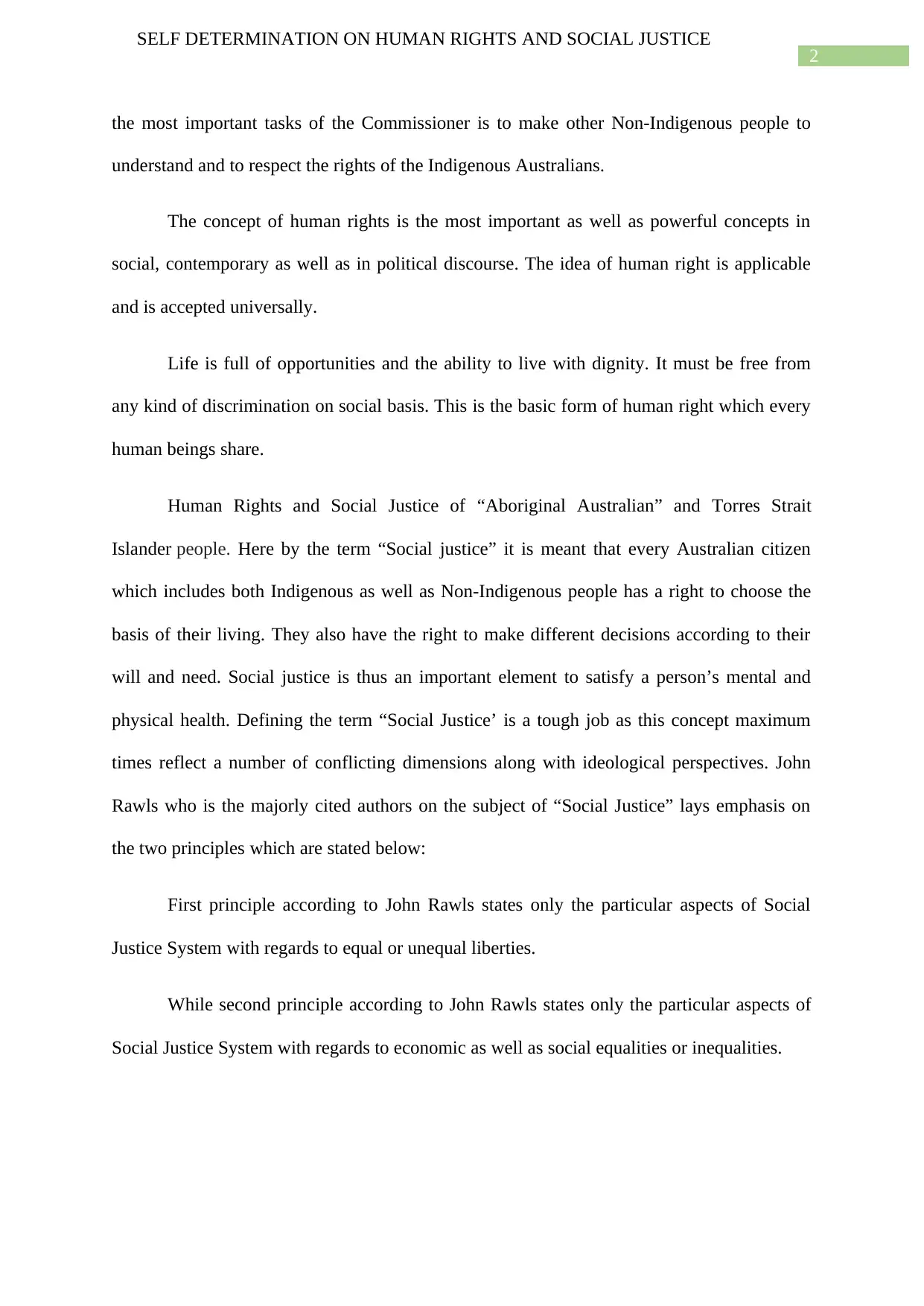
2
SELF DETERMINATION ON HUMAN RIGHTS AND SOCIAL JUSTICE
the most important tasks of the Commissioner is to make other Non-Indigenous people to
understand and to respect the rights of the Indigenous Australians.
The concept of human rights is the most important as well as powerful concepts in
social, contemporary as well as in political discourse. The idea of human right is applicable
and is accepted universally.
Life is full of opportunities and the ability to live with dignity. It must be free from
any kind of discrimination on social basis. This is the basic form of human right which every
human beings share.
Human Rights and Social Justice of “Aboriginal Australian” and Torres Strait
Islander people. Here by the term “Social justice” it is meant that every Australian citizen
which includes both Indigenous as well as Non-Indigenous people has a right to choose the
basis of their living. They also have the right to make different decisions according to their
will and need. Social justice is thus an important element to satisfy a person’s mental and
physical health. Defining the term “Social Justice’ is a tough job as this concept maximum
times reflect a number of conflicting dimensions along with ideological perspectives. John
Rawls who is the majorly cited authors on the subject of “Social Justice” lays emphasis on
the two principles which are stated below:
First principle according to John Rawls states only the particular aspects of Social
Justice System with regards to equal or unequal liberties.
While second principle according to John Rawls states only the particular aspects of
Social Justice System with regards to economic as well as social equalities or inequalities.
SELF DETERMINATION ON HUMAN RIGHTS AND SOCIAL JUSTICE
the most important tasks of the Commissioner is to make other Non-Indigenous people to
understand and to respect the rights of the Indigenous Australians.
The concept of human rights is the most important as well as powerful concepts in
social, contemporary as well as in political discourse. The idea of human right is applicable
and is accepted universally.
Life is full of opportunities and the ability to live with dignity. It must be free from
any kind of discrimination on social basis. This is the basic form of human right which every
human beings share.
Human Rights and Social Justice of “Aboriginal Australian” and Torres Strait
Islander people. Here by the term “Social justice” it is meant that every Australian citizen
which includes both Indigenous as well as Non-Indigenous people has a right to choose the
basis of their living. They also have the right to make different decisions according to their
will and need. Social justice is thus an important element to satisfy a person’s mental and
physical health. Defining the term “Social Justice’ is a tough job as this concept maximum
times reflect a number of conflicting dimensions along with ideological perspectives. John
Rawls who is the majorly cited authors on the subject of “Social Justice” lays emphasis on
the two principles which are stated below:
First principle according to John Rawls states only the particular aspects of Social
Justice System with regards to equal or unequal liberties.
While second principle according to John Rawls states only the particular aspects of
Social Justice System with regards to economic as well as social equalities or inequalities.
⊘ This is a preview!⊘
Do you want full access?
Subscribe today to unlock all pages.

Trusted by 1+ million students worldwide
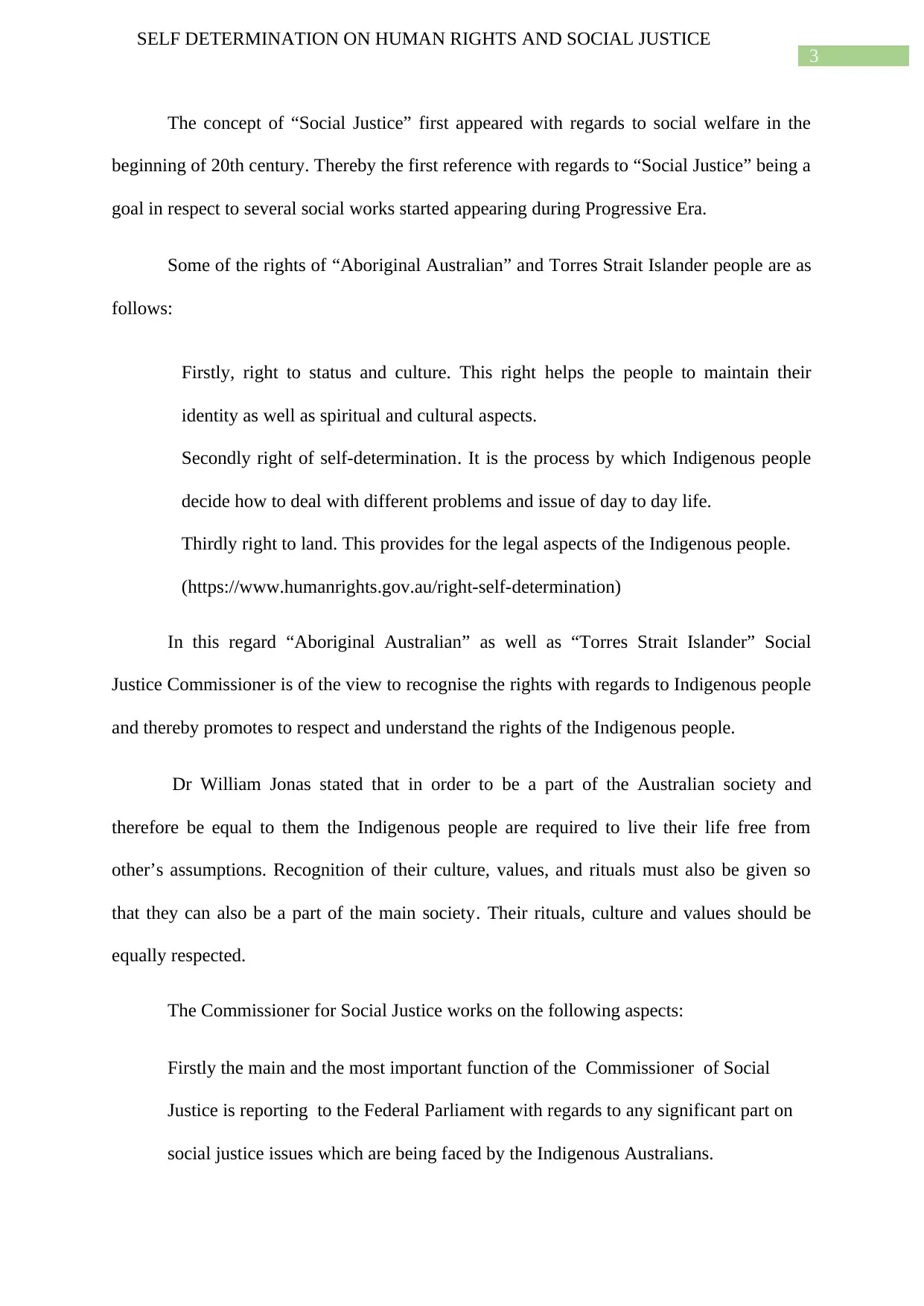
3
SELF DETERMINATION ON HUMAN RIGHTS AND SOCIAL JUSTICE
The concept of “Social Justice” first appeared with regards to social welfare in the
beginning of 20th century. Thereby the first reference with regards to “Social Justice” being a
goal in respect to several social works started appearing during Progressive Era.
Some of the rights of “Aboriginal Australian” and Torres Strait Islander people are as
follows:
Firstly, right to status and culture. This right helps the people to maintain their
identity as well as spiritual and cultural aspects.
Secondly right of self-determination. It is the process by which Indigenous people
decide how to deal with different problems and issue of day to day life.
Thirdly right to land. This provides for the legal aspects of the Indigenous people.
(https://www.humanrights.gov.au/right-self-determination)
In this regard “Aboriginal Australian” as well as “Torres Strait Islander” Social
Justice Commissioner is of the view to recognise the rights with regards to Indigenous people
and thereby promotes to respect and understand the rights of the Indigenous people.
Dr William Jonas stated that in order to be a part of the Australian society and
therefore be equal to them the Indigenous people are required to live their life free from
other’s assumptions. Recognition of their culture, values, and rituals must also be given so
that they can also be a part of the main society. Their rituals, culture and values should be
equally respected.
The Commissioner for Social Justice works on the following aspects:
Firstly the main and the most important function of the Commissioner of Social
Justice is reporting to the Federal Parliament with regards to any significant part on
social justice issues which are being faced by the Indigenous Australians.
SELF DETERMINATION ON HUMAN RIGHTS AND SOCIAL JUSTICE
The concept of “Social Justice” first appeared with regards to social welfare in the
beginning of 20th century. Thereby the first reference with regards to “Social Justice” being a
goal in respect to several social works started appearing during Progressive Era.
Some of the rights of “Aboriginal Australian” and Torres Strait Islander people are as
follows:
Firstly, right to status and culture. This right helps the people to maintain their
identity as well as spiritual and cultural aspects.
Secondly right of self-determination. It is the process by which Indigenous people
decide how to deal with different problems and issue of day to day life.
Thirdly right to land. This provides for the legal aspects of the Indigenous people.
(https://www.humanrights.gov.au/right-self-determination)
In this regard “Aboriginal Australian” as well as “Torres Strait Islander” Social
Justice Commissioner is of the view to recognise the rights with regards to Indigenous people
and thereby promotes to respect and understand the rights of the Indigenous people.
Dr William Jonas stated that in order to be a part of the Australian society and
therefore be equal to them the Indigenous people are required to live their life free from
other’s assumptions. Recognition of their culture, values, and rituals must also be given so
that they can also be a part of the main society. Their rituals, culture and values should be
equally respected.
The Commissioner for Social Justice works on the following aspects:
Firstly the main and the most important function of the Commissioner of Social
Justice is reporting to the Federal Parliament with regards to any significant part on
social justice issues which are being faced by the Indigenous Australians.
Paraphrase This Document
Need a fresh take? Get an instant paraphrase of this document with our AI Paraphraser
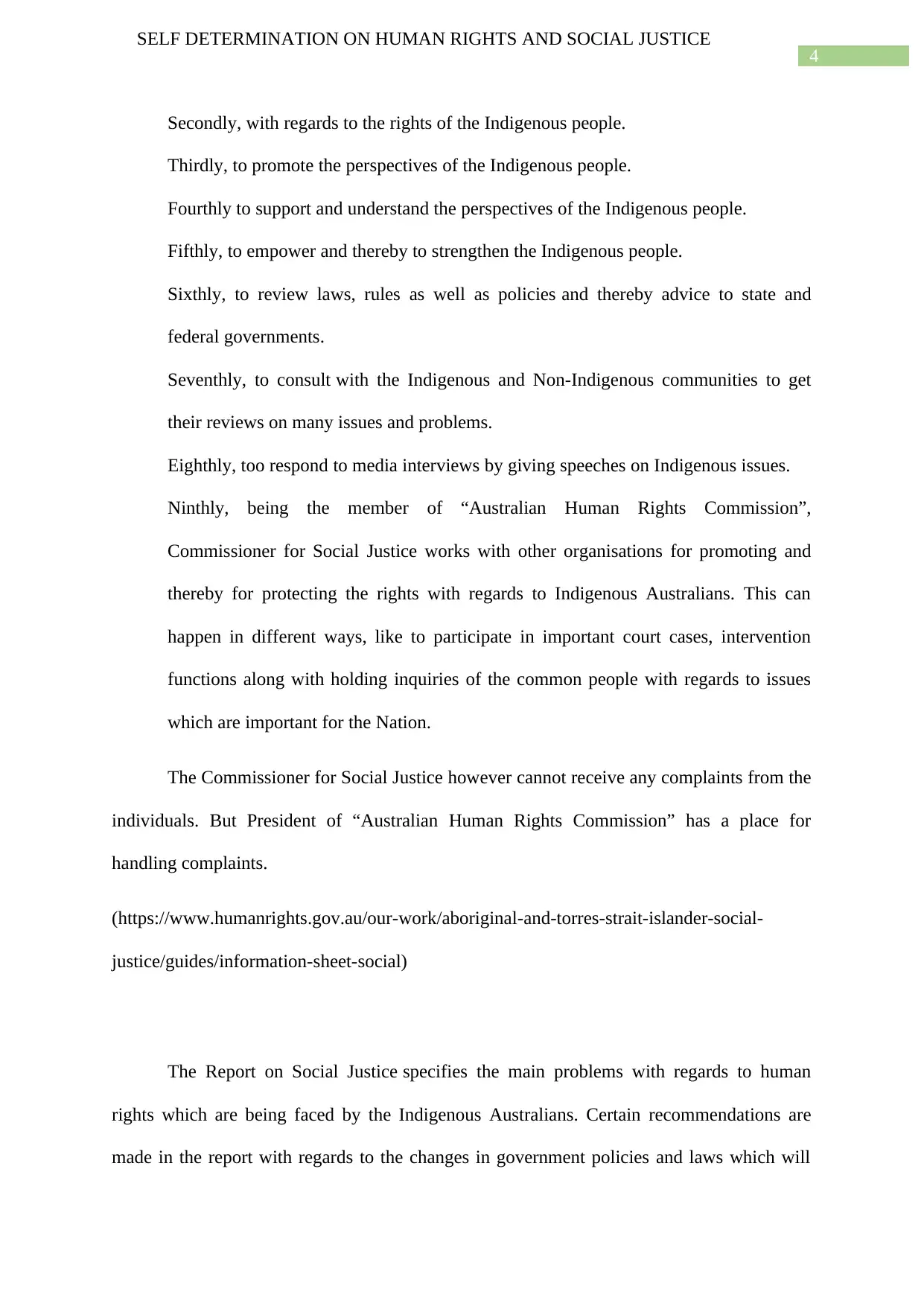
4
SELF DETERMINATION ON HUMAN RIGHTS AND SOCIAL JUSTICE
Secondly, with regards to the rights of the Indigenous people.
Thirdly, to promote the perspectives of the Indigenous people.
Fourthly to support and understand the perspectives of the Indigenous people.
Fifthly, to empower and thereby to strengthen the Indigenous people.
Sixthly, to review laws, rules as well as policies and thereby advice to state and
federal governments.
Seventhly, to consult with the Indigenous and Non-Indigenous communities to get
their reviews on many issues and problems.
Eighthly, too respond to media interviews by giving speeches on Indigenous issues.
Ninthly, being the member of “Australian Human Rights Commission”,
Commissioner for Social Justice works with other organisations for promoting and
thereby for protecting the rights with regards to Indigenous Australians. This can
happen in different ways, like to participate in important court cases, intervention
functions along with holding inquiries of the common people with regards to issues
which are important for the Nation.
The Commissioner for Social Justice however cannot receive any complaints from the
individuals. But President of “Australian Human Rights Commission” has a place for
handling complaints.
(https://www.humanrights.gov.au/our-work/aboriginal-and-torres-strait-islander-social-
justice/guides/information-sheet-social)
The Report on Social Justice specifies the main problems with regards to human
rights which are being faced by the Indigenous Australians. Certain recommendations are
made in the report with regards to the changes in government policies and laws which will
SELF DETERMINATION ON HUMAN RIGHTS AND SOCIAL JUSTICE
Secondly, with regards to the rights of the Indigenous people.
Thirdly, to promote the perspectives of the Indigenous people.
Fourthly to support and understand the perspectives of the Indigenous people.
Fifthly, to empower and thereby to strengthen the Indigenous people.
Sixthly, to review laws, rules as well as policies and thereby advice to state and
federal governments.
Seventhly, to consult with the Indigenous and Non-Indigenous communities to get
their reviews on many issues and problems.
Eighthly, too respond to media interviews by giving speeches on Indigenous issues.
Ninthly, being the member of “Australian Human Rights Commission”,
Commissioner for Social Justice works with other organisations for promoting and
thereby for protecting the rights with regards to Indigenous Australians. This can
happen in different ways, like to participate in important court cases, intervention
functions along with holding inquiries of the common people with regards to issues
which are important for the Nation.
The Commissioner for Social Justice however cannot receive any complaints from the
individuals. But President of “Australian Human Rights Commission” has a place for
handling complaints.
(https://www.humanrights.gov.au/our-work/aboriginal-and-torres-strait-islander-social-
justice/guides/information-sheet-social)
The Report on Social Justice specifies the main problems with regards to human
rights which are being faced by the Indigenous Australians. Certain recommendations are
made in the report with regards to the changes in government policies and laws which will
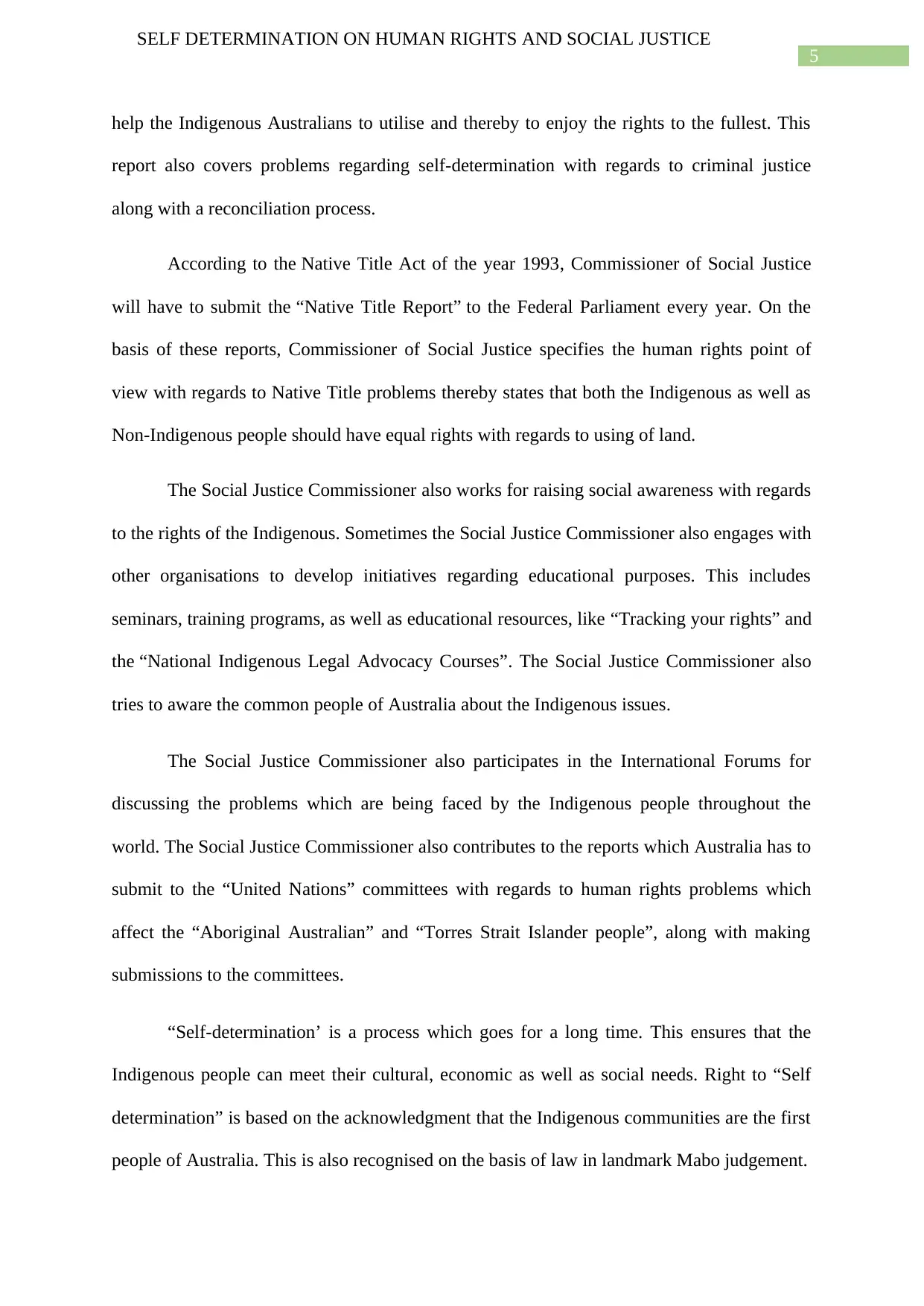
5
SELF DETERMINATION ON HUMAN RIGHTS AND SOCIAL JUSTICE
help the Indigenous Australians to utilise and thereby to enjoy the rights to the fullest. This
report also covers problems regarding self-determination with regards to criminal justice
along with a reconciliation process.
According to the Native Title Act of the year 1993, Commissioner of Social Justice
will have to submit the “Native Title Report” to the Federal Parliament every year. On the
basis of these reports, Commissioner of Social Justice specifies the human rights point of
view with regards to Native Title problems thereby states that both the Indigenous as well as
Non-Indigenous people should have equal rights with regards to using of land.
The Social Justice Commissioner also works for raising social awareness with regards
to the rights of the Indigenous. Sometimes the Social Justice Commissioner also engages with
other organisations to develop initiatives regarding educational purposes. This includes
seminars, training programs, as well as educational resources, like “Tracking your rights” and
the “National Indigenous Legal Advocacy Courses”. The Social Justice Commissioner also
tries to aware the common people of Australia about the Indigenous issues.
The Social Justice Commissioner also participates in the International Forums for
discussing the problems which are being faced by the Indigenous people throughout the
world. The Social Justice Commissioner also contributes to the reports which Australia has to
submit to the “United Nations” committees with regards to human rights problems which
affect the “Aboriginal Australian” and “Torres Strait Islander people”, along with making
submissions to the committees.
“Self-determination’ is a process which goes for a long time. This ensures that the
Indigenous people can meet their cultural, economic as well as social needs. Right to “Self
determination” is based on the acknowledgment that the Indigenous communities are the first
people of Australia. This is also recognised on the basis of law in landmark Mabo judgement.
SELF DETERMINATION ON HUMAN RIGHTS AND SOCIAL JUSTICE
help the Indigenous Australians to utilise and thereby to enjoy the rights to the fullest. This
report also covers problems regarding self-determination with regards to criminal justice
along with a reconciliation process.
According to the Native Title Act of the year 1993, Commissioner of Social Justice
will have to submit the “Native Title Report” to the Federal Parliament every year. On the
basis of these reports, Commissioner of Social Justice specifies the human rights point of
view with regards to Native Title problems thereby states that both the Indigenous as well as
Non-Indigenous people should have equal rights with regards to using of land.
The Social Justice Commissioner also works for raising social awareness with regards
to the rights of the Indigenous. Sometimes the Social Justice Commissioner also engages with
other organisations to develop initiatives regarding educational purposes. This includes
seminars, training programs, as well as educational resources, like “Tracking your rights” and
the “National Indigenous Legal Advocacy Courses”. The Social Justice Commissioner also
tries to aware the common people of Australia about the Indigenous issues.
The Social Justice Commissioner also participates in the International Forums for
discussing the problems which are being faced by the Indigenous people throughout the
world. The Social Justice Commissioner also contributes to the reports which Australia has to
submit to the “United Nations” committees with regards to human rights problems which
affect the “Aboriginal Australian” and “Torres Strait Islander people”, along with making
submissions to the committees.
“Self-determination’ is a process which goes for a long time. This ensures that the
Indigenous people can meet their cultural, economic as well as social needs. Right to “Self
determination” is based on the acknowledgment that the Indigenous communities are the first
people of Australia. This is also recognised on the basis of law in landmark Mabo judgement.
⊘ This is a preview!⊘
Do you want full access?
Subscribe today to unlock all pages.

Trusted by 1+ million students worldwide
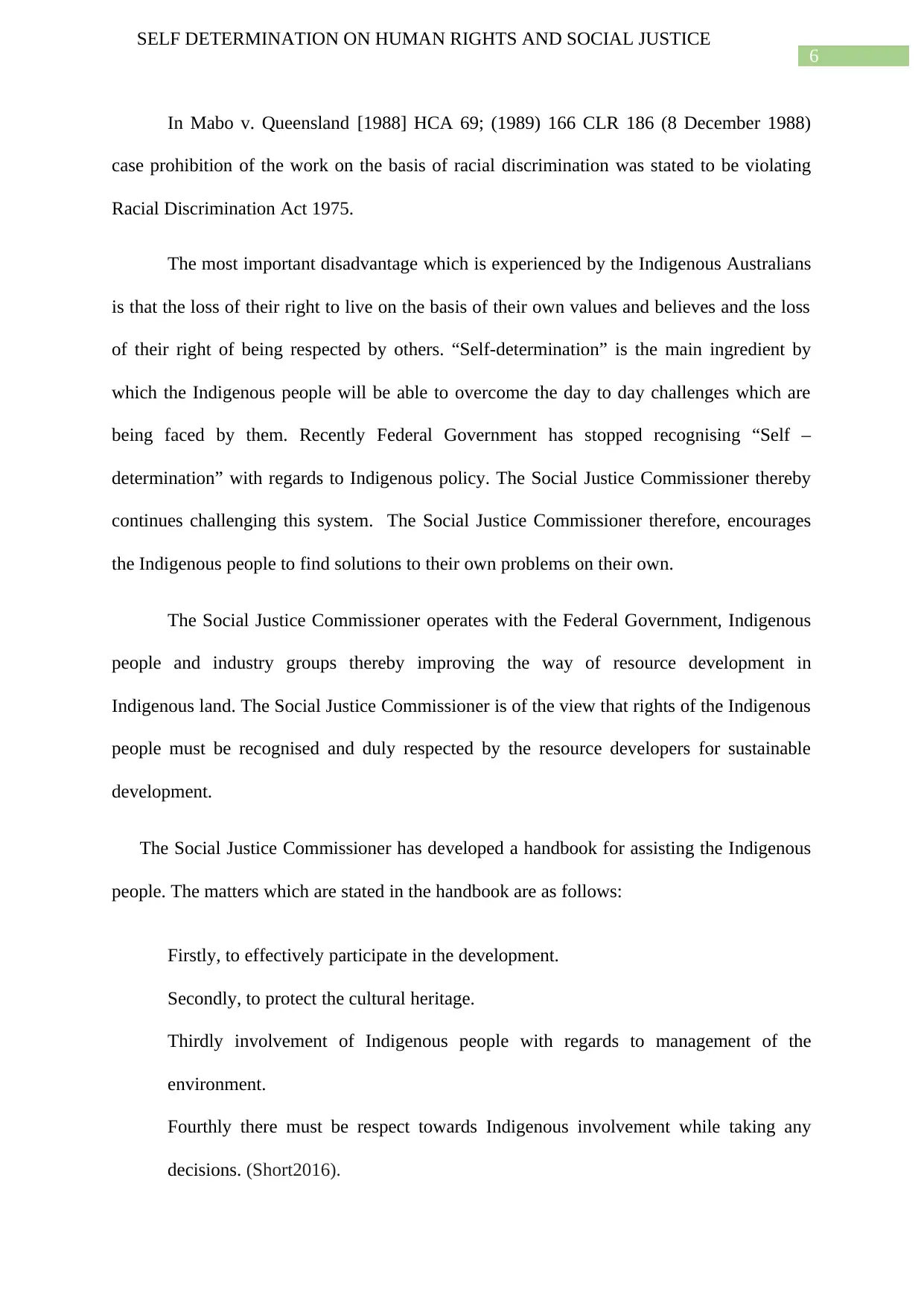
6
SELF DETERMINATION ON HUMAN RIGHTS AND SOCIAL JUSTICE
In Mabo v. Queensland [1988] HCA 69; (1989) 166 CLR 186 (8 December 1988)
case prohibition of the work on the basis of racial discrimination was stated to be violating
Racial Discrimination Act 1975.
The most important disadvantage which is experienced by the Indigenous Australians
is that the loss of their right to live on the basis of their own values and believes and the loss
of their right of being respected by others. “Self-determination” is the main ingredient by
which the Indigenous people will be able to overcome the day to day challenges which are
being faced by them. Recently Federal Government has stopped recognising “Self –
determination” with regards to Indigenous policy. The Social Justice Commissioner thereby
continues challenging this system. The Social Justice Commissioner therefore, encourages
the Indigenous people to find solutions to their own problems on their own.
The Social Justice Commissioner operates with the Federal Government, Indigenous
people and industry groups thereby improving the way of resource development in
Indigenous land. The Social Justice Commissioner is of the view that rights of the Indigenous
people must be recognised and duly respected by the resource developers for sustainable
development.
The Social Justice Commissioner has developed a handbook for assisting the Indigenous
people. The matters which are stated in the handbook are as follows:
Firstly, to effectively participate in the development.
Secondly, to protect the cultural heritage.
Thirdly involvement of Indigenous people with regards to management of the
environment.
Fourthly there must be respect towards Indigenous involvement while taking any
decisions. (Short2016).
SELF DETERMINATION ON HUMAN RIGHTS AND SOCIAL JUSTICE
In Mabo v. Queensland [1988] HCA 69; (1989) 166 CLR 186 (8 December 1988)
case prohibition of the work on the basis of racial discrimination was stated to be violating
Racial Discrimination Act 1975.
The most important disadvantage which is experienced by the Indigenous Australians
is that the loss of their right to live on the basis of their own values and believes and the loss
of their right of being respected by others. “Self-determination” is the main ingredient by
which the Indigenous people will be able to overcome the day to day challenges which are
being faced by them. Recently Federal Government has stopped recognising “Self –
determination” with regards to Indigenous policy. The Social Justice Commissioner thereby
continues challenging this system. The Social Justice Commissioner therefore, encourages
the Indigenous people to find solutions to their own problems on their own.
The Social Justice Commissioner operates with the Federal Government, Indigenous
people and industry groups thereby improving the way of resource development in
Indigenous land. The Social Justice Commissioner is of the view that rights of the Indigenous
people must be recognised and duly respected by the resource developers for sustainable
development.
The Social Justice Commissioner has developed a handbook for assisting the Indigenous
people. The matters which are stated in the handbook are as follows:
Firstly, to effectively participate in the development.
Secondly, to protect the cultural heritage.
Thirdly involvement of Indigenous people with regards to management of the
environment.
Fourthly there must be respect towards Indigenous involvement while taking any
decisions. (Short2016).
Paraphrase This Document
Need a fresh take? Get an instant paraphrase of this document with our AI Paraphraser
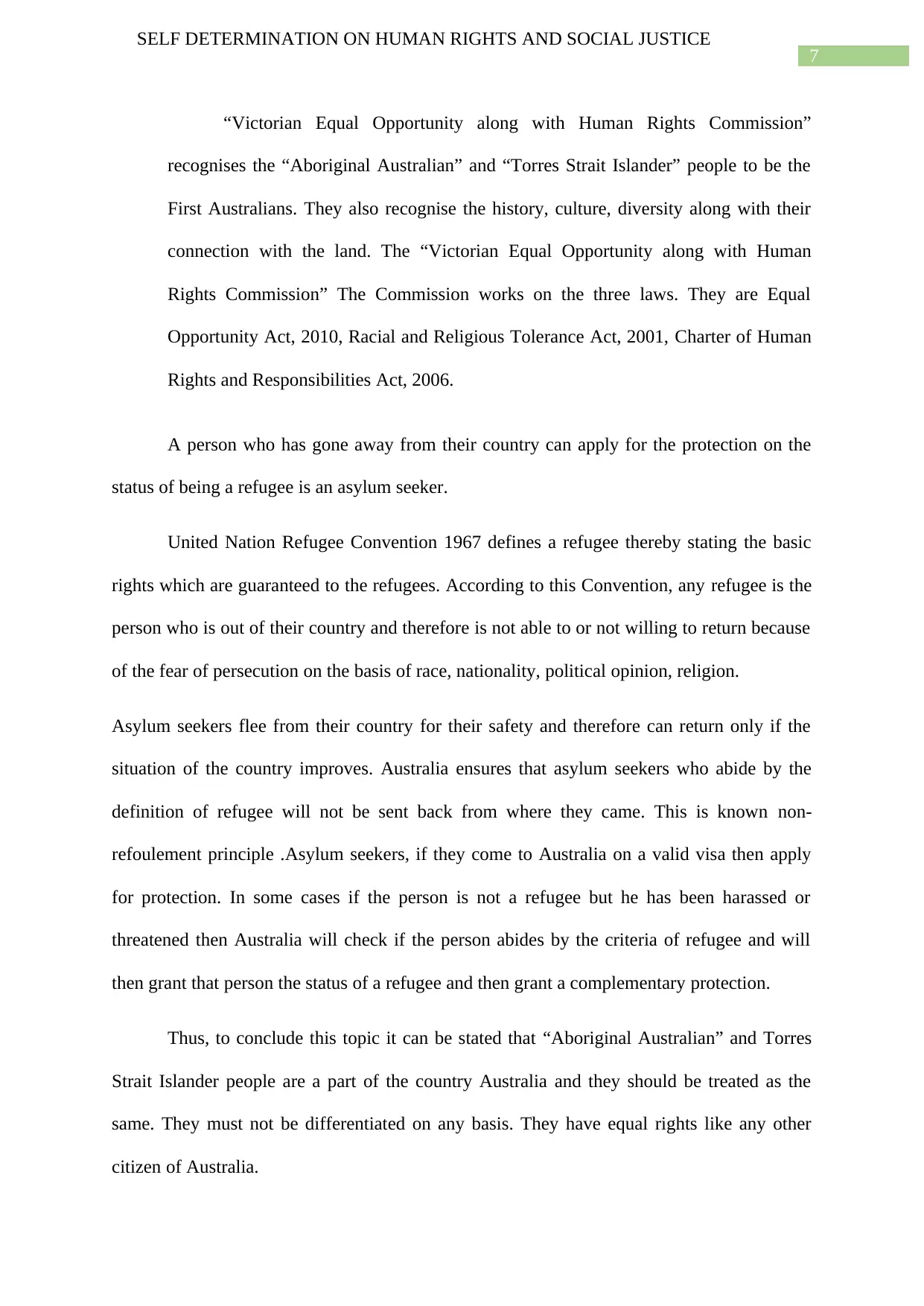
7
SELF DETERMINATION ON HUMAN RIGHTS AND SOCIAL JUSTICE
“Victorian Equal Opportunity along with Human Rights Commission”
recognises the “Aboriginal Australian” and “Torres Strait Islander” people to be the
First Australians. They also recognise the history, culture, diversity along with their
connection with the land. The “Victorian Equal Opportunity along with Human
Rights Commission” The Commission works on the three laws. They are Equal
Opportunity Act, 2010, Racial and Religious Tolerance Act, 2001, Charter of Human
Rights and Responsibilities Act, 2006.
A person who has gone away from their country can apply for the protection on the
status of being a refugee is an asylum seeker.
United Nation Refugee Convention 1967 defines a refugee thereby stating the basic
rights which are guaranteed to the refugees. According to this Convention, any refugee is the
person who is out of their country and therefore is not able to or not willing to return because
of the fear of persecution on the basis of race, nationality, political opinion, religion.
Asylum seekers flee from their country for their safety and therefore can return only if the
situation of the country improves. Australia ensures that asylum seekers who abide by the
definition of refugee will not be sent back from where they came. This is known non-
refoulement principle .Asylum seekers, if they come to Australia on a valid visa then apply
for protection. In some cases if the person is not a refugee but he has been harassed or
threatened then Australia will check if the person abides by the criteria of refugee and will
then grant that person the status of a refugee and then grant a complementary protection.
Thus, to conclude this topic it can be stated that “Aboriginal Australian” and Torres
Strait Islander people are a part of the country Australia and they should be treated as the
same. They must not be differentiated on any basis. They have equal rights like any other
citizen of Australia.
SELF DETERMINATION ON HUMAN RIGHTS AND SOCIAL JUSTICE
“Victorian Equal Opportunity along with Human Rights Commission”
recognises the “Aboriginal Australian” and “Torres Strait Islander” people to be the
First Australians. They also recognise the history, culture, diversity along with their
connection with the land. The “Victorian Equal Opportunity along with Human
Rights Commission” The Commission works on the three laws. They are Equal
Opportunity Act, 2010, Racial and Religious Tolerance Act, 2001, Charter of Human
Rights and Responsibilities Act, 2006.
A person who has gone away from their country can apply for the protection on the
status of being a refugee is an asylum seeker.
United Nation Refugee Convention 1967 defines a refugee thereby stating the basic
rights which are guaranteed to the refugees. According to this Convention, any refugee is the
person who is out of their country and therefore is not able to or not willing to return because
of the fear of persecution on the basis of race, nationality, political opinion, religion.
Asylum seekers flee from their country for their safety and therefore can return only if the
situation of the country improves. Australia ensures that asylum seekers who abide by the
definition of refugee will not be sent back from where they came. This is known non-
refoulement principle .Asylum seekers, if they come to Australia on a valid visa then apply
for protection. In some cases if the person is not a refugee but he has been harassed or
threatened then Australia will check if the person abides by the criteria of refugee and will
then grant that person the status of a refugee and then grant a complementary protection.
Thus, to conclude this topic it can be stated that “Aboriginal Australian” and Torres
Strait Islander people are a part of the country Australia and they should be treated as the
same. They must not be differentiated on any basis. They have equal rights like any other
citizen of Australia.
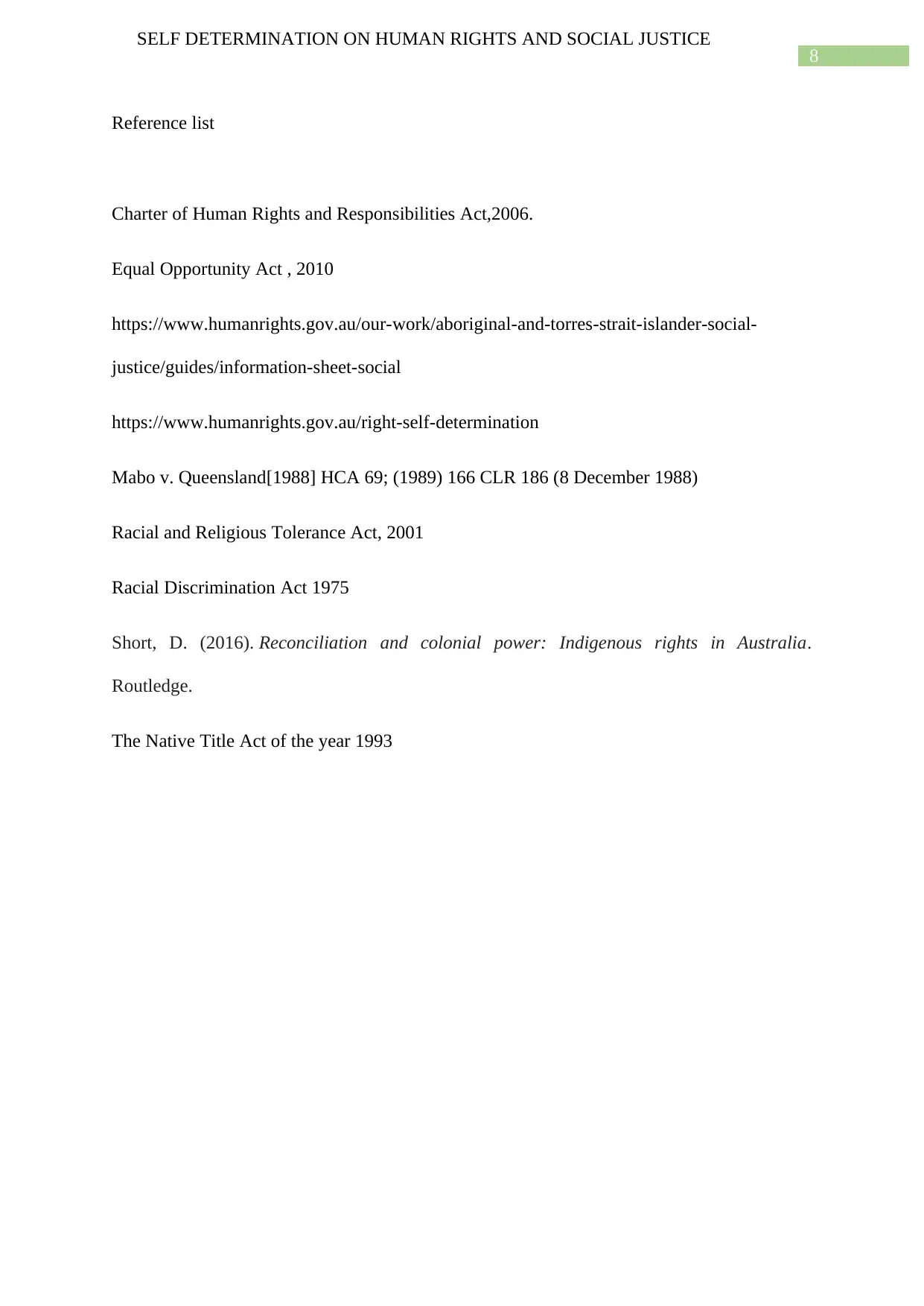
8
SELF DETERMINATION ON HUMAN RIGHTS AND SOCIAL JUSTICE
Reference list
Charter of Human Rights and Responsibilities Act,2006.
Equal Opportunity Act , 2010
https://www.humanrights.gov.au/our-work/aboriginal-and-torres-strait-islander-social-
justice/guides/information-sheet-social
https://www.humanrights.gov.au/right-self-determination
Mabo v. Queensland[1988] HCA 69; (1989) 166 CLR 186 (8 December 1988)
Racial and Religious Tolerance Act, 2001
Racial Discrimination Act 1975
Short, D. (2016). Reconciliation and colonial power: Indigenous rights in Australia.
Routledge.
The Native Title Act of the year 1993
SELF DETERMINATION ON HUMAN RIGHTS AND SOCIAL JUSTICE
Reference list
Charter of Human Rights and Responsibilities Act,2006.
Equal Opportunity Act , 2010
https://www.humanrights.gov.au/our-work/aboriginal-and-torres-strait-islander-social-
justice/guides/information-sheet-social
https://www.humanrights.gov.au/right-self-determination
Mabo v. Queensland[1988] HCA 69; (1989) 166 CLR 186 (8 December 1988)
Racial and Religious Tolerance Act, 2001
Racial Discrimination Act 1975
Short, D. (2016). Reconciliation and colonial power: Indigenous rights in Australia.
Routledge.
The Native Title Act of the year 1993
⊘ This is a preview!⊘
Do you want full access?
Subscribe today to unlock all pages.

Trusted by 1+ million students worldwide
1 out of 9
Related Documents
Your All-in-One AI-Powered Toolkit for Academic Success.
+13062052269
info@desklib.com
Available 24*7 on WhatsApp / Email
![[object Object]](/_next/static/media/star-bottom.7253800d.svg)
Unlock your academic potential
Copyright © 2020–2025 A2Z Services. All Rights Reserved. Developed and managed by ZUCOL.





